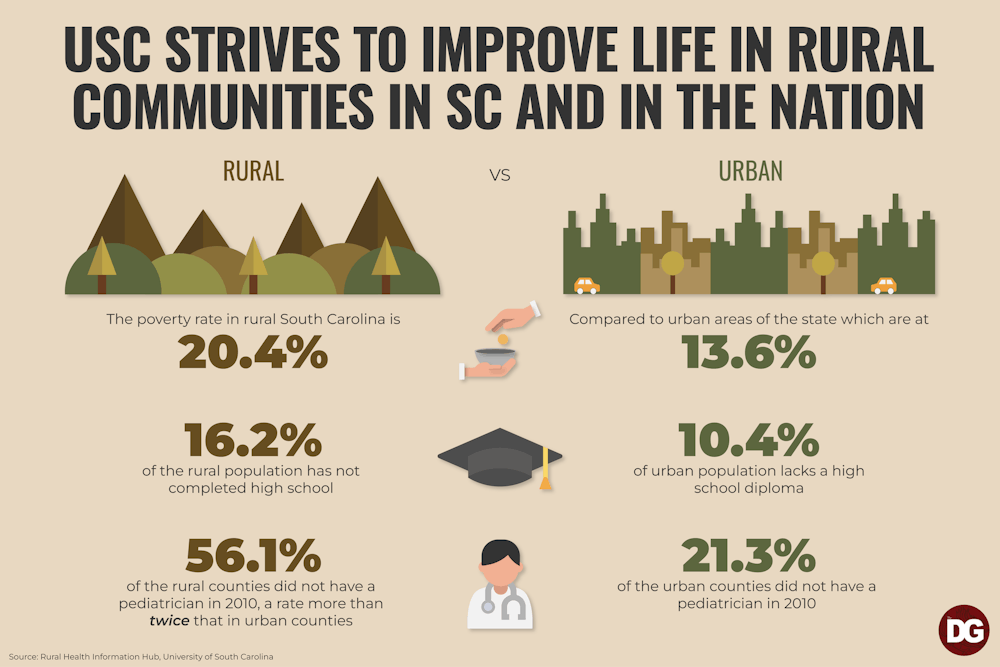USC is dedicated to helping the rural population of South Carolina and the U.S. as a whole. USC has faculty that are improving the lives of people living in these rural areas, specifically in healthcare and STEM education access.
Over 27% of South Carolina's population lives in rural areas, and about 20% of those people live in poverty. Every day, there are around 112 people in rural communities who receive medical services they cannot pay for.
USC's Rural and Minority Health Research Center has existed for the past seven years. It has funded and created initiatives that benefit the health outcomes of people living in rural South Carolina. The center currently has 50 to 70 funded projects across the state.
According to Rural Health Information Hub, "Rural risk factors for health disparities include geographic isolation, lower socioeconomic status, higher rates of health risk behaviors, limited access to healthcare specialists and subspecialists, and limited job opportunities."
The faculty of USC have tried to address these healthcare disparities through their research, and have come up with multiple creative ways to help solve the lack of healthcare access in rural communities.
Dr. Kevin Bennett is the director of the Rural and Minority Health Research Center.
He said one of the biggest issues regarding rural populations' access to healthcare is the need to travel to cities to receive the care they need. The center aims to counter these disadvantages by funding opportunities for specialists and subspecialists to go to their communities. Their other goals include providing more telehealth appointments, creating a network of healthcare workers to offer expertise and investing in community resources.
Bennett said by funding these specialists to provide care in these communities instead of having patients travels hundreds of miles, patients save valuable time and money. By having more telehealth appointments, LGBTQ+ patients can seek health without being stigmatized, especially in communities that condemn them. Having more telehealth options help these patients feel more comfortable talking about their health issues.
Some patients may need constant care from specialists, in which case having specialists travel once in a while to their rural area doesn't help resolve the issues these patients face. But this is still a good step in providing more healthcare in rural South Carolina.
The center also uses a video conferencing software called Project ECHO, which connects healthcare workers with various peers from across the state. It allows a physician in a rural community who needs some expertise on a subject to contact experts in that field within the state.
The center has committed massive amounts of time and money to improving the health outcomes in South Carolina. From the projects that are funded to the initiatives that are created, the center is making rural South Carolina more equitable.
"There's a real sense of identity and pride in these places. I think they are very, very creative and very resilient, and they do a lot with a lot less. So I think that what I am trying to do is to elevate our rural places in the sense of elevating and amplifying what they're already doing," Bennett said.

The faculty and staff at USC dedicate their time and efforts to researching what more can be done for these communities. These USC members have been able to assess the lack of certain resources and provide innovative ways to improve the livelihoods of individuals living in rural communities.
In addition to improving the health of all South Carolina citizens, the faculty of USC want to improve the research being done on how STEM subjects are taught in rural areas to students at all levels of education, throughout the nation. Through a program called IMMERSE, these members seek to improve the STEM education taught in schools in rural communities. The program emerged from USC's Institute for Rural Education and Development which focuses on early exposure to STEM education for rural students.
Matt Irvin is a team member of the IMMERSE program and the director of the Child Development Research Center. This center was developed from USC's College of Education and helps address the needs of children at risk for school failure.
Irvin said he and his colleagues felt there was a lack of clear definitions on the concepts surrounding rural STEM education research. They took it upon themselves to create a program that would educate researchers across the country and help them improve the communities where these researchers work.
The IMMERSE program hasa cohort of students each year, and they offer modules the researchers can learn from. The participants also receive mentoring from team members to help them write grants and write research proposals.
Through this program, the team members are able to address the lack of knowledge in the field of rural STEM education and use their expertise to teach researchers across the nation about this subject.
Although USC hasn't been able to alleviate all the healthcare and education disparities that rural areas face, they are doing their best to research and fund programs that will provide fruitful results.
With the different centers and programs that aim to help rural communities, USC strives to be a leader in rural research. The emphasis that the faculty members put on improving the lives of rural populations shows the care they have for these communities.

